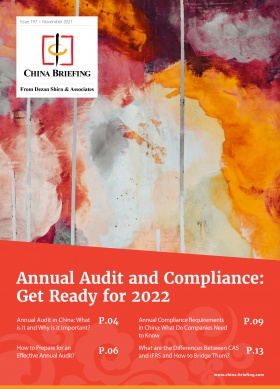China Export Tax Refund Policy: Recent Changes, Documentation Process, Foreign Exchange Management
China has improved the export tax refund policy and traders should note the changes in documentation requirements and penalties for violation. The improvements to the tax refund process are facilitating electronic filing of export tax refund documents and new administration measures to optimize foreign exchange management.
Export tax refund, or export tax rebates, refer to refunds of value-added tax (VAT) and consumption tax (CT) paid by exporting enterprises on exported goods during the production and circulation process.
On April 29, 2022, the State Taxation Administration (STA) released its Announcement on Matters Relating to Further Facilitating the Handling of Export Tax Refund to Promote Stable Development of Foreign Trade (STA Announcement [2022] No. 9), in order to actively implement supporting measures for export tax rebates as unveiled in the Notice on Further Enhancing Supports for Export Tax Refund to Promote Stable Development of Foreign Trade by Ten Authorities Including the STA (Shui Zong Huo Lao Fa [2022] No.36).
Both documents are designed to further assist enterprises in alleviating difficulties, stimulate the vitality and potential of export enterprises, and create a better business environment for foreign trade.
The STA Announcement [2022] No. 9 has simplified the tax handling processes, optimized the tax refund management and reminder services for taxpayers to comply with, refined the administration of record-filing requirements for export tax refund, and improved the administration measures of foreign exchange collection. Moreover, the export tax refund policy for processing trade has been improved.
In this article, we will share two important and major changes following this announcement. The first, is the active implementation of electronic export tax refund filing documents and the second, is the new administration measures of foreign exchange collection.
Change 1: Optimized administration of record-filing documents for export tax refund
Major changes in record-filing documents
Effective from May 1, 2022, there are several changes to the record-filing documentation required for export tax refund. The main changes are summarized below:
|
A Comparison of Old and New Record-Filing Documents Required for Export Tax Refund |
|||
| Old rules: STA Announcement (2012) No.24 | New rules: STA Announcement [2022] No. 9 | Optimization and adjustment | |
| Documents required for record-filing |
|
|
|
|
|
||
|
|
|
|
|
|
||
| Exemption of record-filing |
|
|
|
| Retention method |
|
|
|
| Retention period |
|
|
|
| Inspection requirement |
|
|
|
| Note: The differences and changes are written in red. | |||
As introduced above, you may find the new announcement optimizes and simplifies the administration of record-filing documents.
On one hand, the categories of record-filing documents have been optimized and adjusted. The reasons are:
- To meet the changing reality of the management requirements of customs and other government departments, enterprises are no longer required to manage the shipping orders of export goods as filing documents.
- To guide enterprises to strengthen risk awareness and improve the quality and efficiency of internal control, the necessary entrusting customs declaration agreement, freight/service fee invoices, and other documents for export goods entrusted by enterprises are subject to record-filing administration now.
On the other hand, there are more options or alternatives in the manner of keeping the record-filing documents. To improve the collection efficiency of documents and ease the burden of handling tax matters for the enterprises, export enterprises are allowed to flexibly choose digital, video, or paper methods to keep export tax refund filing documents according to their convenience.
Consequence and punishment of record-filing non-compliance
Failing to do record-filing: If an enterprise fails to do record-filing, it shall not enjoy export tax refund but opt for the tax exemption policy only. This is clearly stipulated by Article 5 of STA Announcement [2013] No.12—where an export enterprise or any other organization has not filed record of documentation pursuant to the provisions (except where the enterprise does not have the relevant filing documentation due to the transaction characteristics of the exports), it shall not enjoy a tax refund and only the tax exemption policy can apply. If an application for tax refund is made, the original application shall be written off by using a negative declaration.
Providing false record-filing documents: If an enterprise provides false record-filing documents, it shall not enjoy export tax refund or tax exemption. Rather, it shall be subject to full VAT payment. This is clearly stipulated by Article 7 of Cai Shui [2012] No. 39—if an export enterprise provides false record-filing documents, it shall not enjoy tax refund or tax exemption, instead, such exported goods and services shall be subjected to VAT.
Affecting the export enterprise credit rating: Currently, tax authorities implement classified administration of export tax refund enterprises. According to STA Announcement [2016] No. 46, the administration for export enterprises is classified to category 1 to category 4 based on their compliance and risk levels, with category 4 being the lowest rank. For the export enterprises obtaining a higher export administration category, they may enjoy some priorities and more convenient channels offered by their local tax bureau to promptly resolve export tax refund issues.
On the other hand, enterprises within a lower administration category will undergo stricter administration. If an export enterprise deals with export refund improperly or even obtains export tax refund fraudulently, its credit will be affected and thus lead to a more stringent export tax refund process. The enterprise may even lose the eligibility for export tax refund and be subject to normal tax payment. In the case of fraudulent export tax refunds, extra legal penalties may apply.
How should enterprises prepare for the new record-filing requirements?
From the aforesaid instructions, you may be aware of the importance of the record-filing job for an export enterprise as the consequence of violations of record-filing will bring huge loss to the enterprise. In such circumstances, even if the document record-filing process is quite straightforward, we strongly advice export enterprises to follow and strictly obey the latest regulations to enjoy the tax benefit.
Change 2: Improved administration of foreign exchange collection for export tax refund
Foreign exchange collection refers to the process of transferring the foreign exchange receivable remitted from overseas for goods exported or services provided by the exporting enterprise to the foreign exchange account of the designated foreign exchange collection bank in China.
Article 8 of the STA Announcement [2022] No. 9 optimized the administration of the foreign exchange collection to further support export tax refund and promote the steady development of foreign trade. The new rules have been in effect since June 21, 2022.
Main optimization of foreign exchange payment collection policy
The new policy sorted out and optimized the management of foreign exchange collection, mainly including the following four aspects:
Reduce the number of pre-declaration matters: Generally, where a taxpayer declares tax refund for exports, foreign exchange collection shall be completed before the deadline for export tax refund declaration. Previously, where foreign exchange was not collected within the stipulated period, the export enterprises had to declare to the tax bureau in advance with proof materials – if it fell within the scope of deemed foreign exchange collection. Only after such formalities were completed was the export enterprise able to apply for export VAT refund. The new policy, however, abolishes the declaration requirement for foreign exchange that cannot be collected (but meet the conditions of deemed foreign exchange collection) before the deadline for export tax refund. The export enterprises can retain relevant materials on their own and proceed to apply for export tax refund.
Expand the scope of deemed foreign exchange collection: For enterprises that have purchased export credit insurance to deal with the impact of the epidemic and have received insurance compensation when they cannot collect foreign exchange payment, the new rules add the insurance compensation as deemed foreign exchange collection, which means that the enterprise can apply for export VAT tax refund in this condition.
Implement classified and accurate management: To strengthen risk prevention, for high-risk enterprises under category 4 for administration of export tax refund or enterprises that have previously provided false or fraudulent used materials for foreign exchange collection – they will be required to provide foreign exchange collection materials at the time when applying for tax refund. In comparison, for enterprises that do not have the above high-risk situations, they do not need to submit materials for foreign exchange collection when applying for tax refund. Rather, they only need to retain relevant materials on their own for record-keeping purposes.
Clarify management of different situations: For export enterprises that temporarily cannot collect foreign exchange and cannot meet the conditions of deemed foreign exchange collection, the export tax refund shall not be handled. But after receiving all the foreign exchange collection, it can continue to apply for export tax refund in accordance with the provisions. For export enterprise that is genuinely unable to collect foreign exchange and cannot meet the conditions of deemed foreign exchange collection, it will be unable to enjoy the tax refund but will only be subject to the VAT exemption policy.
The latest foreign exchange collection regulation for export goods
Based on the above-mentioned changes, the current administration rules for foreign exchange collection are as below:
- For export goods declared by taxpayers for export tax refund, the foreign exchange shall be collected before the deadline of the tax refund application period (April 30 of the following year).
- If the taxpayer fails to collect foreign exchange payment within the stipulated time limit but meets the conditions listed in the “List of Deemed Reasons for Collecting Foreign Exchange and Proof of supporting materials”, the taxpayer shall be deemed to have already collected foreign exchange payment, if it already retains “Information Sheet on the Deemed Collection of Foreign Exchange for Export Goods” and supporting materials.
- If the final date of total foreign exchange collection stipulated in the export contract is after the deadline of the tax refund application period, the foreign exchange collection shall be completed before the date stipulated in the contract.
- Generally, the export enterprises are not required to submit foreign exchange collection materials to the tax authorities. Rather, they just need to retain the material for record and potential future inspection. However, a taxpayer within export tax refund administration category 4 shall submit materials of foreign exchange collection to the tax authorities at the time when declaring export tax refund.
How should enterprises prepare for the new foreign exchange payment collection policy?
- Try to maintain a high export tax refund administration credit level and avoid becoming a category 4 enterprise
As introduced above, tax authorities impose strict control measures towards the category 4 enterprises, such as requiring them to submit foreign exchange collection materials at the time when declaring export tax refund, which will result in the delay of export tax refund application as well as the cash collection of tax refund.
Accordingly, export enterprises are suggested to maintain a high export administration credit level and avoid becoming a category 4 enterprise.
- Time management for the payment term of export sales contracts
Export enterprises need to check the payment term of the export sales contracts carefully. If the payment term falls after the deadline of the tax refund period (April 30 of the following year), the enterprises are suggested to:
- first, retain the export contract and generate the “Information Sheet on the Deemed Collection of Foreign Exchange for Export Goods” for the record.
- secondly, collect corresponding foreign exchange payment at/before the payment term stipulated in the contract. (Otherwise, these export goods cannot enjoy tax fund but are only subject to tax exemption, which will trigger great loss.)
- Where an enterprise is unable to collect foreign exchange payment, try to see if it can meet the conditions of deemed foreign exchange collection
Exports for which a taxpayer is genuinely unable to collect foreign exchange collection are subject to VAT exemption policy rather than export tax refund, unless the provisions on deemed foreign exchange receipts are not complied with.
So, if the export enterprise can confirm with the 10 scenarios of the deemed collection of foreign exchange, they may still enjoy the export tax refund policy by retaining related supporting materials.
Summary
For export enterprises, it is always a vital topic for them to maintain and follow the latest rules for export tax refund, to comply with the regulations and enjoy the benefits of the policy properly.
If your business requires assistance with tax refunds, preferential tax policies, or other tax issues, you can consult our local experts by contacting us at china@dezshira.com.
About Us
China Briefing is written and produced by Dezan Shira & Associates. The practice assists foreign investors into China and has done so since 1992 through offices in Beijing, Tianjin, Dalian, Qingdao, Shanghai, Hangzhou, Ningbo, Suzhou, Guangzhou, Dongguan, Zhongshan, Shenzhen, and Hong Kong. Please contact the firm for assistance in China at china@dezshira.com.
Dezan Shira & Associates has offices in Vietnam, Indonesia, Singapore, United States, Germany, Italy, India, and Russia, in addition to our trade research facilities along the Belt & Road Initiative. We also have partner firms assisting foreign investors in The Philippines, Malaysia, Thailand, Bangladesh.
- Previous Article China’s Provincial GDP in H1 2022: Who Were the Top Performers?
- Next Article How Did Didi Run Afoul of China’s Cybersecurity Regulators? Understanding the US$1.2 Billion Fine









